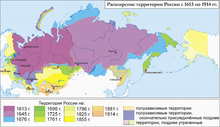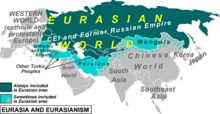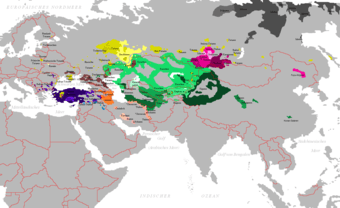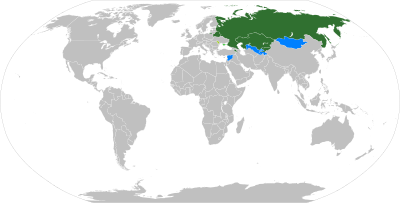Eurasianism
Eurasianism (Russian: евразийство, yevraziystvo) is a political movement in Russia that posits that Russian civilisation does not belong in the "European" or "Asian" categories but instead to the geopolitical concept of Eurasia. Originally developing in the 1920s, the movement was supportive of the Bolshevik Revolution but not its stated goals of enacting communism, seeing the Soviet Union as a stepping stone on the path to creating a new national identity that would reflect the unique character of Russia's geopolitical position. The movement saw a minor resurgence after the collapse of the Soviet Union at the end of the 20th century, and is mirrored by Turanism in Turkic and Finnic nations.
Early 20th century
_and_near_abroad.png)
Eurasianism is a political movement that has its origins in the Russian émigré community in the 1920s. The movement posited that Russian civilization does not belong in the "European" category (somewhat borrowing from Slavophile ideas of Konstantin Leontyev), and that the October Revolution of the Bolsheviks was a necessary reaction to the rapid modernization of Russian society. The Eurasianists believed that the Soviet regime was capable of evolving into a new national, non-European Orthodox Christian government, shedding the initial mask of proletarian internationalism and militant atheism (to which the Eurasianists were strongly opposed).
The Eurasianists criticized the anti-Bolshevik activities of organizations such as ROVS, believing that the émigré community's energies would be better focused on preparing for this hoped for process of evolution. In turn, their opponents among the emigres argued that the Eurasianists were calling for a compromise with and even support of the Soviet regime, while justifying its ruthless policies (such as the persecution of the Russian Orthodox Church) as mere "transitory problems" that were inevitable results of the revolutionary process.
The key leaders of the Eurasianists were Prince Nikolai Trubetzkoy, P.N. Savitsky, P.P. Suvchinskiy, D. S. Mirsky, K. Čcheidze, P. Arapov, and S. Efron. Philosopher Georges Florovsky was initially a supporter, but backed out of the organization claiming it "raises the right questions", but "poses the wrong answers". A significant influence of the doctrine of the Eurasianists can be found in Nikolai Berdyaev's essay The Sources and Meaning of Russian Communism.
Several organizations similar in spirit to the Eurasianists sprung up in the emigre community at around the same time, such as the pro-Monarchist Mladorossi and the Smenovekhovtsi.
Several members of the Eurasianists were affected by the Soviet provocational TREST operation, which had set up a fake meeting of Eurasianists in Russia that was attended by the Eurasianist leader P.N. Savitsky in 1926 (an earlier series of trips were also made two years earlier by Eurasianist member P. Arapov). The uncovering of the TREST as a Soviet provocation caused a serious morale blow to the Eurasianists and discredited their public image. By 1929, the Eurasianists had ceased publishing their periodical and had faded quickly from the Russian émigré community.
"Greater" Russia

The political-cultural concept espoused by some in Russia is sometimes called the "Greater" Russia and is described as a political aspiration of pan-Russian nationalists and irredentists to retake some or all of the territories of the other republics of the former Soviet Union and territory of the former Russian Empire not to mention the Democratic Republic of Afghanistan and amalgamate them into a single Russian state. Alexander Rutskoy, the Vice President of Russia from 1991–1993, asserted irredentist claims to Narva in Estonia, Crimea in Ukraine, and Ust-Kamenogorsk in Kazakhstan, among other territories.[1]
Before war broke out between Russia and Georgia in 2008, Aleksandr Dugin visited South Ossetia and predicted: "Our troops will occupy the Georgian capital Tbilisi, the entire country, and perhaps even Ukraine and the Crimean Peninsula, which is historically part of Russia, anyway."[2] Former South Ossetian president Eduard Kokoity is a Eurasianist and argues that South Ossetia never left the Russian Empire and should be part of Russia.[3]
Neo-Eurasianism

Neo-Eurasianism (Russian: неоевразийство) is a Russian school of thought which gained a following in Russia during the years leading up to the collapse of the Soviet Union and in the period afterwards that considers Russia to be culturally closer to Asia than to Western Europe.
The school of thought takes its inspiration from the Eurasianists of the 1920s, such as Prince Nikolai Trubetzkoy while P.N. Savitsky. Lev Gumilev is often cited as the founder of the Neo-Eurasianist movement, and he was quoted as saying that "I am the last of the Eurasianists."[4]
At the same time, major differences have been noted between Gumilev's work and those of the original Eurasianists.[4] Gumilev's work is controversial for its scientific methodology (the use of his own conception of ethnogenesis and the notion of "passionarity" of ethnoses). At any rate, Gumilev's work has been a source of inspiration for the neo-Eurasianist authors, of whom Aleksandr Dugin has the highest profile. Political scientist Anton Shekhovtsov defines Dugin's version of Neo-Eurasianism as "a form of a fascist ideology centred on the idea of revolutionising the Russian society and building a totalitarian, Russia-dominated Eurasian Empire that would challenge and eventually defeat its eternal adversary represented by the United States and its Atlanticist allies, thus bringing about a new ‘golden age’ of global political and cultural illiberalism".[5]
Gumilev's contribution to neo-Eurasianism lies in the conclusions he reaches from applying his theory of ethnogenesis, namely that the Mongol occupation of 1240–1480 AD (known as the "Mongol yoke") had shielded the emergent Russian ethnos from the aggressive neighbor to the West, allowing it to gain time to achieve maturity. The idea of Eurasianism contrasts with Konstantin Leontyev's Byzantism, which is similar in its rejection of the West, but identifies with the Byzantine Empire rather than with Central Asian tribal culture.
Early 21st century Russian political party

The ideology of the movement was partially incorporated into a new movement of the same name after the 1991 fall of the Soviet Union, influenced the political theorist Aleksandr Dugin to publish in 1997 a magnum opus by the name of Foundations of Geopolitics. He later founded the Eurasia Party on the Russian political scene.
Pragmatic Eurasianism
Ideologically, President of Kazakhstan Nursultan Nazarbayev’s speech in March 1994 at Moscow State University became the starting point for the practical implementation of Eurasianism. He proposed an integration paradigm that was fundamentally new at the time: to more towards a Eurasian Union based on economic integration and common defense.[6] This vision has been later materialized in the Eurasian Economic Union and the Collective Security Treaty Organization. Eurasianism in Nazarbayev’s reading is rather a system of foreign policy and economic ideas and priorities rather than a philosophy. This type is Eurasianism is unequivocally open to the outside world.
Eurasian Economic Union
The Eurasian Economic Union was founded in January 2015, consisting of Armenia, Belarus, Kazakhstan, Kyrgyzstan, Russia and observer member Moldova, all of them being previous members of the Soviet Union. Members include states from both Europe and Asia; the union promotes political and economic cooperation among members.
Shanghai Cooperation Organisation
The Shanghai Cooperation Organisation is a Eurasian political, economic and security alliance, the creation of which was announced on 15 June 2001 in Shanghai, China. It is the largest regional organisation in the world in terms of geographical coverage and population, covering three-fifths of the Eurasian continent and nearly half of the human population.
Collective Security Treaty Organization
The Collective Security Treaty Organization is an intergovernmental military alliance that was signed on 15 May 1992. In 1992, six post-Soviet states belonging to the Commonwealth of Independent States—Russia, Armenia, Kazakhstan, Kyrgyzstan, Tajikistan, and Uzbekistan—signed the Collective Security Treaty (also referred to as the "Tashkent Pact" or "Tashkent Treaty").[7] Three other post-Soviet states—Azerbaijan, Belarus, and Georgia—signed the next year and the treaty took effect in 1994. Five years later, six of the nine—all but Azerbaijan, Georgia, and Uzbekistan—agreed to renew the treaty for five more years, and in 2002 those six agreed to create the Collective Security Treaty Organization as a military alliance. Uzbekistan rejoined the CSTO in 2006 but withdrew in 2012.
Turkey

Since the late 1990s, Eurasianism has gained some following in Turkey among nationalist (ulusalcı (tr)) circles. The most prominent figure who is associated with Dugin is Doğu Perinçek, the leader of the Patriotic Party (Vatan Partisi).[8] Some analysts of modern Turkish politics have suggested that the ultra-nationalist and secular elite that are also affiliated with the members of the Turkish military, who have come under close scrutiny with the Ergenekon coup case, have close ideological and political ties to the Eurasianists.[9]
Turkic Council
The Turkic Council or, in full, the Cooperation Council of Turkic-Speaking States, is an international organization comprising some of the Turkic countries. It was founded on 3 October 2009 in Nakhchivan.
The General Secretariat is in İstanbul, Turkey. The member countries are Azerbaijan, Kazakhstan, Kyrgyzstan, Uzbekistan and Turkey. Turkmenistan and Hungary are not currently official members of the council due to their neutral stance; however, they are possible future members of the council.[10] Uzbekistan announced its intention to join the council on 30 April 2018,[11] and formally applied for membership on September 12, 2019.[12] Since late 2018, Hungary is an observer and may soon request full membership in the Turkic Council.[13]
Hungary
The Hungarian far-right party and movement, Jobbik, espouses a form of Hungarian nationalism that fosters kinship with other "Turanian" peoples, including the Turkic peoples of Asia.[14]
Romania
The political activist Silviu Brucan, was involved in shaping eurasianism as a geopolitical concept, with articles focused on Russian politics that were published in a monthly magazine called Sfera Politicii.[15]
In literature
In the future time depicted in George Orwell's novel Nineteen Eighty Four, the Soviet Union has mutated into Eurasia, one of the three superstates dominating the world.
Similarly, Robert Heinlein's story "Solution Unsatisfactory" depicts a future in which the Soviet Union would be transformed into "The Eurasian Union".
See also
References
- Chapman, Thomas; Roeder, Philip G. (November 2007). "Partition as a Solution to Wars of Nationalism: The Importance of Institutions". American Political Science Review. 101 (4): 680. doi:10.1017/s0003055407070438.
- "Road to War in Georgia: The Chronicle of a Caucasian Tragedy", Spiegel, August 25, 2008.
- Neo-Eurasianist Aleksandr Dugin on the Russia-Georgia Conflict, CACI Analyst, September 3, 2008.
- Laruelle, Marlène "Histoire d'une usurpation intellectuelle: Gumilev, 'le dernier des eurasistes'? (analyse des oppositions entre L.N. Gumilev et P.N. Savickij" in Sergei Panarin (ed.) Eurasia: People & Myths, Moscow, Natalis Press, 1993 (Russian lang.)
- Shekhovtsov, Anton (2018) Russia and the Western Far Right: Tango Noir, Abingdon, Routledge, p. 43.
- Nazarbayev, Nursultan (1997). "Eurasian Union: Ideas, Practice, Perspectives 1994-1997" (in Russian). Moscow: Fund for cooperation and development in social and political science. p. 480.
- ed, Alexei G. Arbatov ... (1999). Russia and the West : the 21st century security environment. Armonk, NY [u.a.]: Sharpe. p. 62. ISBN 978-0765604323. Retrieved 25 February 2015.
- Mehmet Ulusoy: "Rusya, Dugin ve‚ Türkiye’nin Avrasyacılık stratejisi" Aydınlık Dec. 5 2004, pp. 10–16
- Archived 2011-08-01 at the Wayback Machine Emre Uslu: Turkish military: a source of anti-Americanism in Turkey. Today's Zaman, July 31, 2011.
- "Turk Dili Konusan Ulkeler Isbirligi Konseyi'nin Kurulmasina Dair Nahcivan Anlasmasi" (PDF). Turkkon.org. Archived from the original (PDF) on 2012-01-06. Retrieved 2014-03-05.
- "Uzbekistan decides to join 'Turkic alliance' during Erdogan's visit". hurriyetdailynews.com. Retrieved 2018-04-30.
- "Uzbekistan Officially Applies for Membership in Turkic Council".
- "Hungary is now part of the assembly of "Turkic Speaking Countries"". Hungarian Free Press. 2018-11-25. Retrieved 2019-06-01.
- Evelyne Pieiller, "Hungary Looks to the Past for Its Future," Le Monde Diplomatique, English ed. November, 2016. http://mondediplo.com/2016/11/10hungary
- Brucan, Silviu. "Geopolitics and Strategy" (PDF). sferapoliticii.ro. Sfera Politicii. Retrieved 2 May 2017.
Sources
- The Mission of Russian Emigration, M.V. Nazarov. Moscow: Rodnik, 1994. ISBN 5-86231-172-6
- Russia Abroad: A comprehensive guide to Russian Emigration after 1917 also some Ustrialov's papers in the Library
- The criticism towards the West and the future of Russia-Eurasia
- Laruelle, Marlene, ed. (2015). Eurasianism and the European Far Right: Reshaping the Europe–Russia Relationship. Lexington Books. ISBN 978-1-4985-1068-4.
- Stefan Wiederkehr, Die eurasische Bewegung. Wissenschaft und Politik in der russischen Emigration der Zwischenkriegszeit und im postsowjetischen Russland (Köln u.a., Böhlau 2007) (Beiträge zur Geschichte Osteuropas, 39).
.svg.png)
